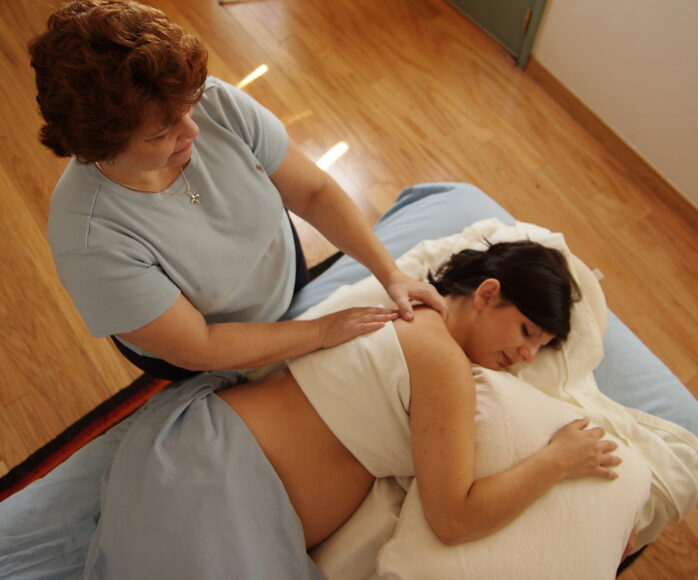
Pregnancy is a beautiful journey filled with anticipation and joy, but it also brings about physical discomfort and emotional changes. As an expecting mother, taking care of yourself is of utmost importance.
One way to alleviate the aches and pains associated with pregnancy is through prenatal massage. In this article, we will explore the benefits of prenatal massage and why it is a valuable therapy for expecting moms.
Prenatal massage is a specialized form of therapy designed to cater to the unique needs of pregnant women. It involves the gentle manipulation of muscles and soft tissues to provide relief from common discomforts experienced during pregnancy. Prenatal massage offers a multitude of benefits and can significantly improve the overall well-being of expecting moms.
Understanding Prenatal Massage

This is also known as pregnancy massage, is a safe and effective way to promote relaxation and reduce pregnancy-related discomfort. It utilizes various techniques, including Swedish, deep tissue massage, and lymphatic drainage, tailored specifically for pregnant women. The therapist takes into consideration the anatomical and physiological changes occurring in the body during pregnancy to ensure a comfortable and beneficial experience.
Benefits of Prenatal Massage
Relieves Muscle Tension and Joint Pain
Carrying the extra weight of pregnancy can put strain on the muscles and joints, leading to tension and pain. Prenatal massage targets these areas of discomfort, helping to release muscle tension and alleviate joint pain. The therapist uses gentle strokes and kneading techniques to improve blood circulation and promote relaxation, resulting in reduced muscle soreness.
Reduces Swelling and Edema
Swelling, particularly in the legs and feet, is a common complaint during pregnancy due to increased fluid retention. Prenatal massage incorporates techniques that stimulate the lymphatic system, aiding in the reduction of swelling and edema. By improving lymph circulation, excess fluids are effectively drained, resulting in decreased swelling and a greater sense of comfort.
Eases Back and Hip Pain

As the belly grows, the body’s center of gravity shifts, placing additional stress on the lower back and hips. Prenatal massage targets these areas, providing relief from backaches and hip pain. The therapist may employ specific techniques to alleviate muscular imbalances and restore proper alignment, helping to alleviate discomfort and restore mobility.
Improves Sleep Quality
Sleep disturbances are common during pregnancy, often caused by physical discomfort and hormonal changes. Prenatal massage promotes relaxation and reduces anxiety, allowing for better sleep quality. By soothing the body and mind, expecting moms can experience more restful sleep, which is essential for their overall well-being.
Alleviates Stress and Anxiety

Pregnancy can bring about a range of emotions, including stress and anxiety. Prenatal massage provides a nurturing and calming experience, helping to reduce stress levels and promote emotional well-being. The release of endorphins during the session induces a sense of relaxation and contentment, leaving expecting moms feeling refreshed and rejuvenated.
Safety Precautions
While prenatal massage is generally safe for most pregnant women, it is crucial to consult with a healthcare provider before seeking this therapy. Certain high-risk pregnancies or medical conditions may warrant avoiding or modifying the techniques used. It is important to communicate openly with the therapist about any concerns or medical conditions to ensure a safe and tailored experience.
When to Avoid Prenatal Massage
There are specific situations in which prenatal massage should be avoided to prevent any potential risks. These include:
- High-risk pregnancies
- Pregnancy-induced hypertension (PIH)
- Preeclampsia
- Severe swelling
- Preterm labor symptoms
- Recent surgery or injury
Always consult with your healthcare provider if you are unsure whether prenatal massage is suitable for you.
Finding a Qualified Prenatal Massage Therapist

When seeking a therapist, it is essential to choose a qualified professional experienced in working with pregnant women. Look for therapists who have undergone specialized training in prenatal massage and possess the necessary certifications. Additionally, consider their reputation and read reviews from previous clients to ensure a positive and safe experience.
What to Expect During a Session
During the session, the therapist will create a comfortable and serene environment for you to relax. You will be positioned on a specialized massage table or cushioned with supportive pillows to accommodate your growing belly.
The therapist will use gentle and soothing strokes, focusing on areas of concern discussed before the session. Communication with the therapist is key, as they can adjust the pressure and techniques based on your comfort level.
Tips for Maximizing the Benefits of Prenatal Massage
To maximize the benefits of prenatal massage, consider the following tips:
- Stay hydrated before and after the session.
- Wear comfortable clothing to your session.
- Communicate openly with your therapist about your needs and concerns.
- Practice deep breathing during the therapy to enhance relaxation.
- Follow any post-therapy recommendations provided by the therapist.
By incorporating these tips, you can ensure a more enjoyable and rewarding prenatal massage experience.
Frequently Asked Questions (FAQs)
Is it safe during the first trimester?
- Yes, it is generally considered safe throughout pregnancy, including the first trimester. However, it is crucial to consult with your healthcare provider before scheduling an appointment.
How often should I receive prenatal massage?
The frequency of sessions varies for each individual. It is recommended to discuss this with your therapist, who can tailor a treatment plan based on your specific needs.
Can it induce labor?
There is no conclusive evidence to suggest that prenatal massage can induce labor. However, certain acupressure points are best avoided during pregnancy to prevent any potential risks.
Can prenatal massage help with sciatica pain?
Yes, the sessions can be effective in providing relief from sciatica pain. The therapist can utilize specific techniques to alleviate pressure on the sciatic nerve and reduce discomfort.
Are there any side effects of prenatal massage?
It is generally safe and well-tolerated. However, some individuals may experience mild soreness or fatigue after a session. If you have any concerns, consult with your healthcare provider.
Conclusion
Prenatal massage is a soothing and beneficial therapy that can significantly enhance the well-being of expecting moms. It provides relief from pregnancy-related discomforts, promotes relaxation, and reduces stress and anxiety. By prioritizing self-care during your pregnancy journey and indulging in the therapeutic benefits of therapies, you can nurture both your body and mind.
In conclusion, it offers a gentle and effective approach to address the physical and emotional challenges of pregnancy. It is a safe and relaxing therapy that can alleviate muscle tension, reduce swelling, ease back and hip pain, improve sleep quality, and alleviate stress and anxiety. If you’re an expecting mom seeking relief and relaxation, consider incorporating prenatal massage into your self-care routine.
For additional info on prenatal massage for expecting moms find out more by visiting Prenatal Massage for Expecting Moms and experience the soothing benefits it can provide. Remember to consult with your healthcare provider before beginning any new therapeutic practices during pregnancy.











